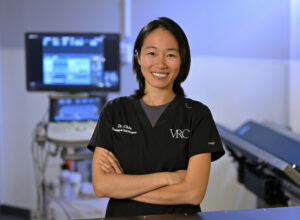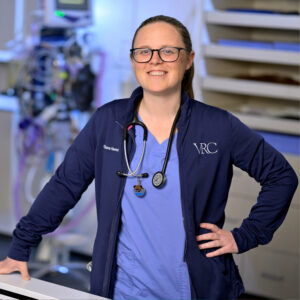
Total hip replacement (THR) is a surgical procedure for dogs with severe hip dysplasia that is the most advanced surgical option available, but requires a strictly controlled and lengthy recovery phase for success. Dog owners must be dedicated and diligent about their dog’s rest and rehabilitation while their pet recovers.
If you’re considering THR for your dog, check out the frequently asked questions below, and then schedule an orthopedic consultation with the VRC surgery service.
Q: What is total hip replacement in dogs?
Answer: The canine hip is a ball-and-socket joint that involves two bony structures—the femoral head (i.e., the ball on the end of the thigh bone) and the acetabulum (i.e., the concave portion of the pelvis). Dogs who are suffering from hip dysplasia have malformed and rough surfaces on the bones, which causes painful arthritis and reduced mobility.
A THR involves removing the ball and socket and replacing them with metal and polyethylene implants to create smooth, natural, pain-free movement.
Q: What are the requirements for my dog to be considered for THR surgery?
A: Although THR may be recommended sooner, eligible dogs must be skeletally mature, which varies by breed, but is generally between 9 to 12 months of age. Adult dogs are considered surgical candidates as long as they are in good health with no additional orthopedic problems. Because the implants are available only in certain sizes, dogs must weigh more than 40 pounds to be considered for THR surgery. Also, because of an extensive recovery process that requires a good amount of hands-on care, the dog’s temperament and tolerance for intensive care should be considered.
If you have questions about your dog’s eligibility, schedule a consultation with the VRC team.
Q: What are the risks associated with THR surgery in dogs?
A: As with any surgical procedure, THR in dogs can involve specific complications. However, complications, which may include hip luxation, femoral fracture, implant loosening, and infection, are rare and can often be identified and mitigated or corrected during the recovery process.
We attribute the reduced complication rate to our advanced anesthesia protocols and safety measures, tailored pain management, and our board-certified veterinary surgeons’ vast experience and specialized training. To further lower your dog’s complication risk, you must strictly follow your surgeon’s instructions regarding postoperative incision care and exercise restrictions.
Q: What is the recovery process for dogs undergoing THR?
A: Many dog owners express concerns about THR surgery, but the recovery period is often the most precarious. During this time, excess hip joint movement can cause injury and damage the repair. Additionally, post-operative infections at the incision site can increase the risk for joint infections, which may result in implant failure.
After surgery, dogs are hospitalized for several days to ensure their pain is managed appropriately. During your pet’s discharge, the VRC team will provide specific post-operative instructions that must be precisely followed to ensure timely healing and prevent setbacks, complications, and surgical failure.
Typical THR recovery can take four to six months, depending on the dog’s progress. During the first 10 to 14 days, the incision must be kept clean and dry. For at least the first month, your dog must be activity-restricted (i.e., brief leash walks only to give relief from confinement to a crate or small pen). Dogs must not be allowed to run, jump, play, or walk on slick floors, which can damage their healing bones. Regular rechecks at VRC are essential to assess your dog’s healing and recovery progress. Your dog’s surgeon will instruct you at each step, including when your dog can safely begin physical rehabilitation.
Q: What is veterinary rehabilitation and how does it help THR recovery?
A: Veterinary rehabilitation is similar to physical therapy for humans and is used to promote healing, decrease pain, and accelerate return to function. For post-operative THR dogs, these goals are achieved with various modalities, such as passive range of motion, underwater treadmill therapy, laser therapy, stretching, and targeted exercises designed to gradually increase your dog’s flexibility and strength. The VRC rehabilitation team works closely with your dog’s surgeon, ensuring they receive individualized care and treatments that address their stage in the healing journey.
Q: Will my dog need both hips replaced?
A: Although hip dysplasia is generally a bilateral condition (i.e., affects both hips), most dogs show marked improvement in comfort and quality of life after their first THR and do not need the second hip replaced.
Q: Will my dog enjoy a normal life after THR surgery?
A: Total hip replacement is a significant time, effort, and financial investment. However, the payoff is equally high—THR is the gold-standard surgery for large-breed dogs and often the best way to eliminate pain and provide normal hip function and mobility. Dogs with successful THR outcomes can enjoy an excellent quality of life without the pain, stiffness, and limited activity caused by hip dysplasia.
Total hip replacement can be life-transforming for dogs suffering from hip dysplasia. If you’re interested in learning more about THR at VRC, ask your pet’s primary veterinarian for a referral, or make a consultation appointment with our surgery service.






 Email
Email



